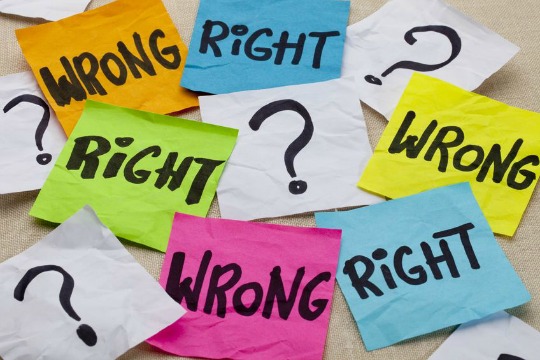

Morality And Student Loans

Thanks to recent legislative decisions, student loans are all over the news. While politicians debate the future of our loan interest rates, we’re still required to pay our loans every month. When we’re sick or underemployed or with finances otherwise spread thin, we still pay them. Why? Because we borrowed the money and we need to pay it back. Responsible borrowers don’t dispute this fact (though by the look of comments directed toward us on some online articles, one might think we do). But the current interest rate debate has (finally) resulted in conversations about the actual ethics behind the country’s student loan programs.
A recent Wall Street Journal piece finally used words I’ve been waiting to hear when referring to the student loan industry: “It is, rather, the principle of the thing.” Yes. Thank you. It is the principle of the thing. Here’s what I’m talking about:
College costs have skyrocketed. Public, private, in-state, out-of-state, commuter or resident, no matter. In fact, according to the article, the cost of attending college has gone up 7.45 percent annually for the last 35 years. Costs for just an undergraduate degree can easily creep into six figures, and the growing number of middle class student from families with too much money to qualify for need-based aid but not enough to actually afford four years of college are increasingly financing their educations with student loans.
Students and their parents sign loan documents at each disbursement (usually each semester), so, yes, the majority understand what they’re getting into. Once graduation comes, though, reality hits and the loan payments, principal plus interest, become due.
As I see it, here’s where the morality thing kicks in. We, as a nation, are allowing our system of higher education to saddle our youth with insane debt — often as much as a mortgage on a home. You could argue that a good education is just as, if not more, important as a home. But when you’re done paying your mortgage, you have a house. When you’re done paying your loans, you still have the same education (although you’re probably a bit savvier, financially).
Ironically, young people paying hundreds of dollars each month toward loans have a hard time getting mortgages or car loans. It’s proven that high student debt causes many borrowers to delay life events like marriage and children in order to finish paying for their education.
Then there’s the issue of interest rates. Today, I could walk into a bank and get a 30-year fixed mortgage with a rate of 4.625 percent. A five-year new car loan carries an interest rate of 4.08 percent. Yet some federally-backed student loans now carry an interest rate of 6.8 percent. And, unlike mortgages or cars, there are few programs and systems to help borrowers who get in trouble. You can’t foreclose on an education or repossess a diploma. And, of course, student loans are the one form of debt that is almost impossible to discharge in bankruptcy.
The skyrocketing costs of college aside (the aforementioned article does a good job of at least proposing some solutions), loan borrowers deserve a fair chance at repayment. They deserve protection from the pitfalls of loans, especially early in their careers when cash flow isn’t as easy to come by. At the very least, they deserve the same sort of protection that someone carrying a similar amount in housing or credit card debt receives.
Defaulting on your student debt can literally ruin your life. Credit scores tank and then borrowers are on the hook for the entirety of the loan — which means any prospective lender will see a massive black mark on your credit report for years and years until you’re able to pay it back (plus seriously explosive interest and collection fees.) I’m shocked and saddened that our government and education industry continues to allow this to spiral out of control — especially at a time when we should be investing in our future. We need more exposure of this and we need action; hopefully the Wall Street Journal’s call-to-action will be the beginning of a more effective conversation about the morality of our current student loan system.







Agreed! Some of my loans are at 8.25%. I just don’t think it’s right that the government not only has cut education funding as a % of the total tuition due per student but is also profiting off of our broken education system. I wish there was a way to do a variable rate consolidation loan. Then many of us would have actually benefited from low rates and could have accelerated principal payoff.